*
PRESS RELEASE SOURCE: PRIME VIDEO
*
Welcome to our third of the Clarkson’s Farm interviews. The first, with Jeremy Clarkson himself can be found here and here is the 2nd one with Kaleb Cooper.
*
Lisa Hogan
What can viewers expect from series two?
Well, there’s not that much you can change on the farm. The land is the same, and the characters are the same. We had another massive heatwave last year, so that really plays into it. At the beginning of the year, it was rain, heat, rain, heat. It was an incredible crop in the end, but we did have a really worrying time when it was like, “We need rain, we need rain.” We started feeding all the animals their winter food in the summer, because they didn’t have any grass. So that’s another thing that you have to consider. The weather always causes extra cost and extra panic. That’s us sharing the heartbreak of farming.
*
Were you surprised by the success of the first series?
Yeah, totally. Jeremy thought four people from his car show might watch it. We were flabbergasted. Jeremy watched it again after the first few days. I came in, and I was like, “You’re watching your stuff again?” and he goes, “I literally don’t understand…” But I think it’s to do with the fact you can see a whole year in one go, and it all gels together. I don’t know if you’ve read A Year in Provence, but you can read that in a couple of weeks, and you really get the feeling of the year. You can watch our show in a couple of days, and you’re entrenched in the farm. You’re living it yourself. Because – is it going to rain? Are the crops going to work? It’s all that kind of stuff. I was kind of petrified by a second series because we all knew it had been a success. You meet up with everyone on the first day, and you’re like, “Am I going to try too hard?” but we just had a cup of tea, and it was totally back to normal, and it was all fine.
*
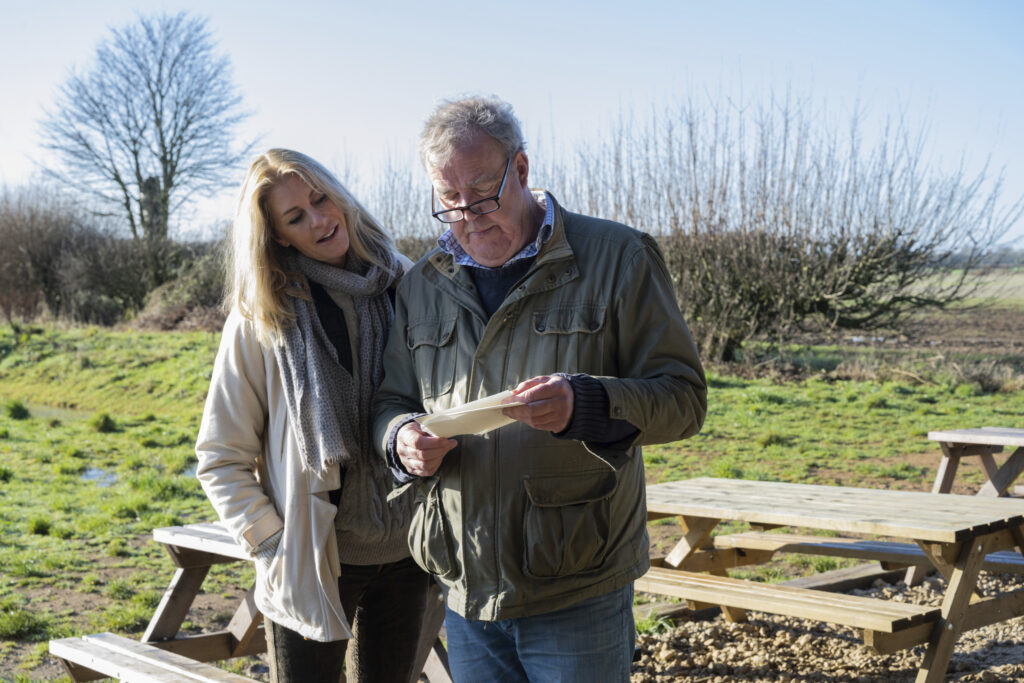
*
You mention A Year in Provence. Jeremy has said before it’s not a bucolic, lovely show like Countryfile: do you think that’s part of the appeal?
With serious issues, you can bring it into episode two, and then again it crops up in episode four, and then it happens again in episode six. It’s like a piece of elastic throughout the year: you can see these issues come up every time. Filming it all, and releasing it all in one go, and allowing people to see it in one stretch, I think really helps bring that whole story together.
*
What sort of reaction have you seen from fans at the Diddly Squat farm shop?
I used to go up there before the show dropped and I just loved talking to everyone with different points of view and just chatting. I’m quite shy normally but when you’re behind a countertop, it’s very easy to banter with someone. Then when the show dropped, there were people coming from everywhere. So many farmers came and said, “Thank you so much, because it shows the plight of farming.” And so many people from abroad came because it touched them so much. You know, it was extraordinary talking to people. I love it up there because normally when you have a farm shop or a bar or something, it’s in a little village, but because this is on top of a hill with such a massive landscape in front of you – that’s just so stunning.
For me, the view is the attraction. But also, the customers will come along, and Jeremy will rock up in his tractor and people will go, “Oh my God, look, a tractor!” They’d run with their phones to the edge of the field and take photographs. You’d swear Mick Jagger was naked onstage. I’m sorry, it’s a bloke in a tractor. What are you doing?!
*
*
They turn up and they’re tall talking about the tramlines. It’s educated people so much. Previously they would just pass by the fields, or never come to the countryside, and now they’re educated in it. This is one of the things that I did last year – to start championing agriculture as a proper A-Level. Because it’s fascinating! And that’s our future. It’s a subject that’s always fumbled along with bright, lovely farmers who know so much. But hopefully, our show will make people realise that this can be a really rewarding profession. If they can study it but mix it with business or with science that would really bring those together.
*
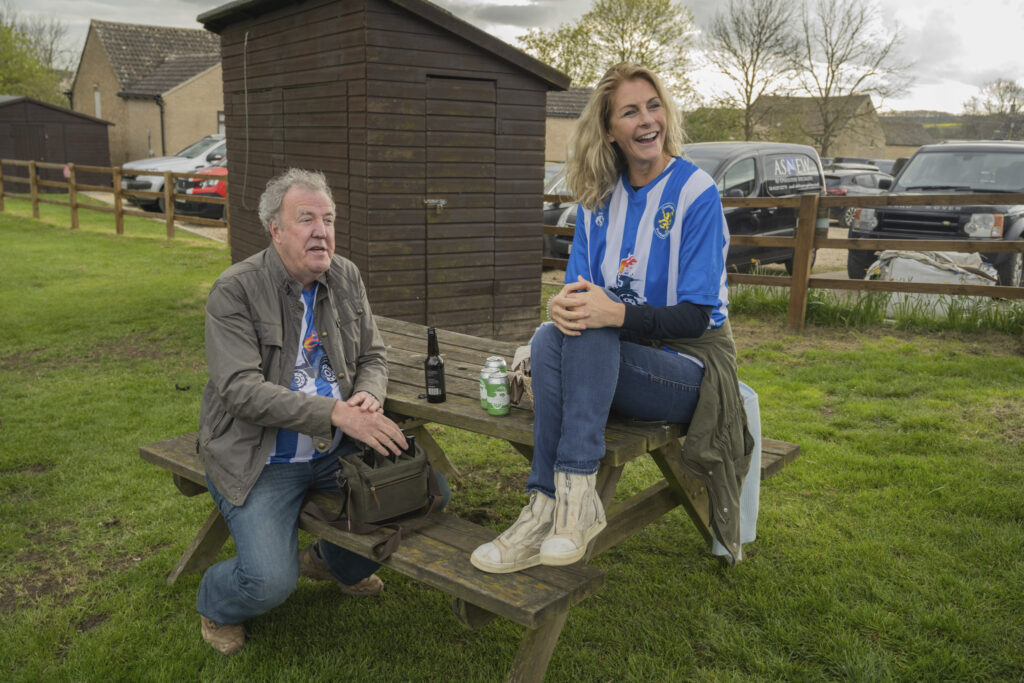
*
Do you find it also makes people think about where their food is coming from?
Precisely. They won’t be throwing out that extra half-loaf of bread now because they’ll be like, “Oh, God, someone’s really tried to make that product and make a profit. Let’s put it in the freezer instead.”
*
On the other hand, your baby, the Diddly Squat farm shop, has been a success.
It really has and I love creating the products and doing all the packing and marketing. The shop now has 270 different products: it’s heaving, we literally can’t fit any more in there. Jeremy’s Hot Sausage is doing really well, we’ve got chilli sauces, wasabi sausages, ice cream. They came and told us we had to source everything for the shop from within a 16-mile radius and it’s really forced me to dig deep, and it’s actually been a brilliant thing for us. We spent a day picking elderflower from the hedgerows, we’re always foraging; I’ve given up the gym now, being on the farm keeps me fit.
*
Charlie Ireland
What was it like being back for a second series?
The interesting thing is, last time we had to explain a lot more to the crew about what we were doing, and what was coming up, so that they knew when to turn the cameras on. This time it feels easier to film because we just sort of did what we were doing, and they were just sort of there.
*
What did you think of the reaction to the first series?
I’ve been really pleased with the reaction, especially from peers: people in the industry who do consultancy work or agronomy, which is part of what we do. I went to an agronomy meeting and had an interesting chat about the efficacy of certain chemicals on disease in wheat. It was quite a niche meeting. A couple of guys came up afterwards and said, “It’s great. I’ve done this for 30 years, and now my mates finally understand what I do. Thanks.”
That’s the nicest thing, the recognition from within the industry. Jeremy understands what is going on and how to explain it at a pretty base level. The hardest thing is trying to explain at the right level. Jeremy will say to me, “Okay, I don’t understand a word you said, so for the ladies and gentlemen at home…”
*

*
Do you think or hope it’s having an effect on people outside of the farming community in terms of seeing the difficulties that farmers go through and where their food comes from?
I think for a small amount of people, yes. But the main thing – and I think this will come through in the second series as well – is the amount of people I’ve met up at the farm shop who’ve said they would never have come to the Cotswolds or gone outside into the countryside and enjoyed and appreciated what is there, but they now look over their hedge. There’s definitely more of an appreciation.
*
You’ve been involved in helping Jeremy to fight the council and the locals who are opposed to his restaurant plans. Did you realise early on that getting the locals on side would be vital for the business?
Yeah. Because for any project, activities are seen by all the locals. If the activities change, you need people to understand why they are changing, both from a business and commercial point of view, but also how it’s going to impact the community and the landscape. You do get farmers who just say, “We’ve got rights to do this” but 99 per cent of farmers will engage locally. When we did some planning work at my family home, I phoned the five neighbours to say, “By the way, this planning application is going in” and they said, “Nobody has ever done that”, but there’s nothing to hide. Nobody likes surprises so if you just speak to people first, it helps. Like so much of society now, there are two poles, but the majority of people sit in the middle and don’t really say a lot. You have vocal people at either end who have their views.
*
*
Jeremy went to a local meeting in which people started off very angry, and he appeared to win them over.
I think most people are quite reasonable, aren’t they? And going back to explaining what is happening – if you don’t say anything, people will judge what you are doing in the worst possible way. But if you explain what you want to happen, it can be alright. I think people had heard that Jeremy wanted to create some kind of theme park. Our job was to say: “No, what we want to do is something very simple.” We want to bring other producers into the mix, and involve the local community. If it’s adding value to local businesses, meaning they can be more commercially viable in the local area, that has to be a good thing.
*
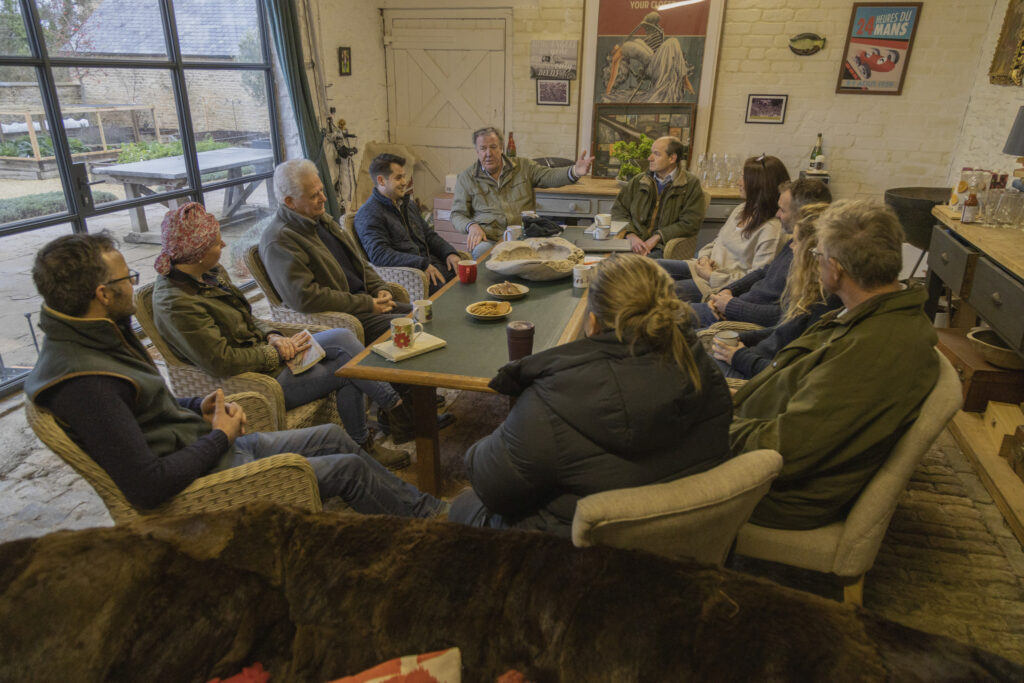
*
Because local businesses are struggling, as we saw in the scene with Emma who runs the dairy, who doesn’t take a wage.
That’s a wonderful scene. She lost 40 per cent of her herd to TB and it was really hard. She said, “Basically, you’ve kept us afloat, because we can sell our milk to your shop for £1 a litre, whereas we’re getting 29p from the milk people.” OK, it’s gone up since then, but, you know, our outlet is vital for her.
I think people will be really shocked by that scene.
*
Is that quite a common thing, that a farmer wouldn’t take a wage?
Effectively what they do is run their costs through the farm: so, for example they might pay their energy using the farm income, and so on. But in fairness, all they’re doing is surviving. They can afford to feed themselves; they can afford to keep themselves warm in their house, but ultimately, they’re not putting any cash away, which sounds crackers when you’re sitting on an asset that has the capital tied up. Say you’ve got 100 cows – there’s probably £200,000 worth of cash there – and then you’ve got all the infrastructure, so you’ve probably got £500,000 in assets. Most sensible people would say, “Surely you make ten per cent on that? You should be making £50,000 a year.” But it’s nothing like that. So that’s why the risk is so high.
*
TB is a big challenge for dairy farmers, as Jeremy discovered in this series.
It was possibly the tensest day of filming, the first TB test. Nobody wants bad results because it does have a great impact. It’s crackers because people will say, “You’re going to kill the animals anyway. What does it matter?” But you’re food producers. If it doesn’t go to its final destination of being consumed…So, yes, TB is an issue for many, many farms. We put lots of strategies in to try and help reduce the risk.
*
And you’ve also been hit by avian flu.
If you’ve got a free-range unit, they’re not meant to be holed up all the time. We got by last year. That’s nothing like it’s been this year. It’s quite stressful.
*
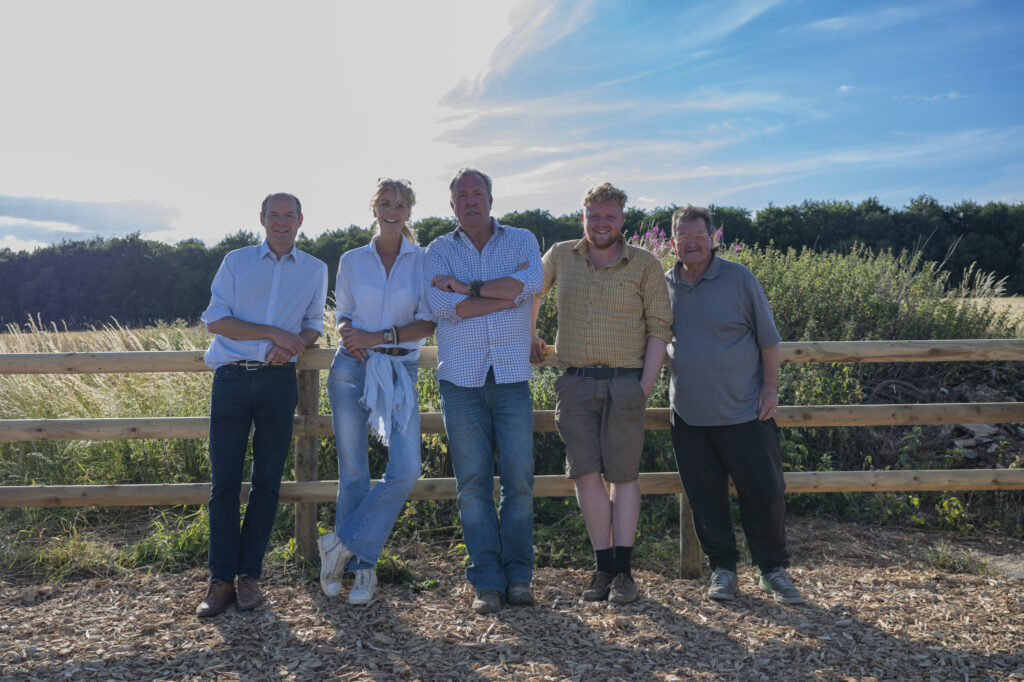
*
Between all the challenges and the successes, how would you summarise this year?
I think it’s largely been really good. The growing season was good. The crops have done very well, and we’ve got a nice diversity: pasta and spelt and lots of funky stuff. The wheat price probably added £60 or £70 a tonne due to the war. If you’re producing 1,000 tonnes, that just goes straight to the bottom line because your costs haven’t gone up. But now costs have gone through the roof. So, we’ve rolled half that money straight back into paying for next year. So, although it’s made a profit, there’s no cash left.
*
Is the Diddly Squat farm shop profit-making?
I think some products in the shop have more margin on them than others and it’s interesting: things like bread and pasta are not actually that profit-making. The value-added stuff comes from things like the lamb pasties and honey. Honey’s a great seller. Happy bees make good honey.
*
Are you impressed by how Jeremy and Lisa have adapted to the challenges?
I’m always amazed at the imagination of some people [laughs]. I think they’re good entrepreneurial businesspeople. You see it across the industry. There are some really clever, thriving businesses, and they would certainly be in that part of it. Developing your own brand takes effort. Lisa has put in so much effort into the farm shop. They’re always in product development. You know – “what else can we grow on the farm?” The chillies are delicious. We had three chest-freezers full of chillies at one stage to go into the batch-making of chutney. You know, that’s a lot of chilli, because you don’t put much of them into the mix. So, the innovation has been great.
*
We should mention Kaleb, who has become such a star but doesn’t seem to have let it go to his head.
The amazing thing about Kaleb is – actually, the core of what he does is – he still wants to be on a tractor. Everything else goes on. And I think the crops look better this year than they’ve ever looked. His effort on the farm is fantastic.
*
If you would like to donate to help this website, you can support us here: https://ko-fi.com/5dpopculturewebsite
*


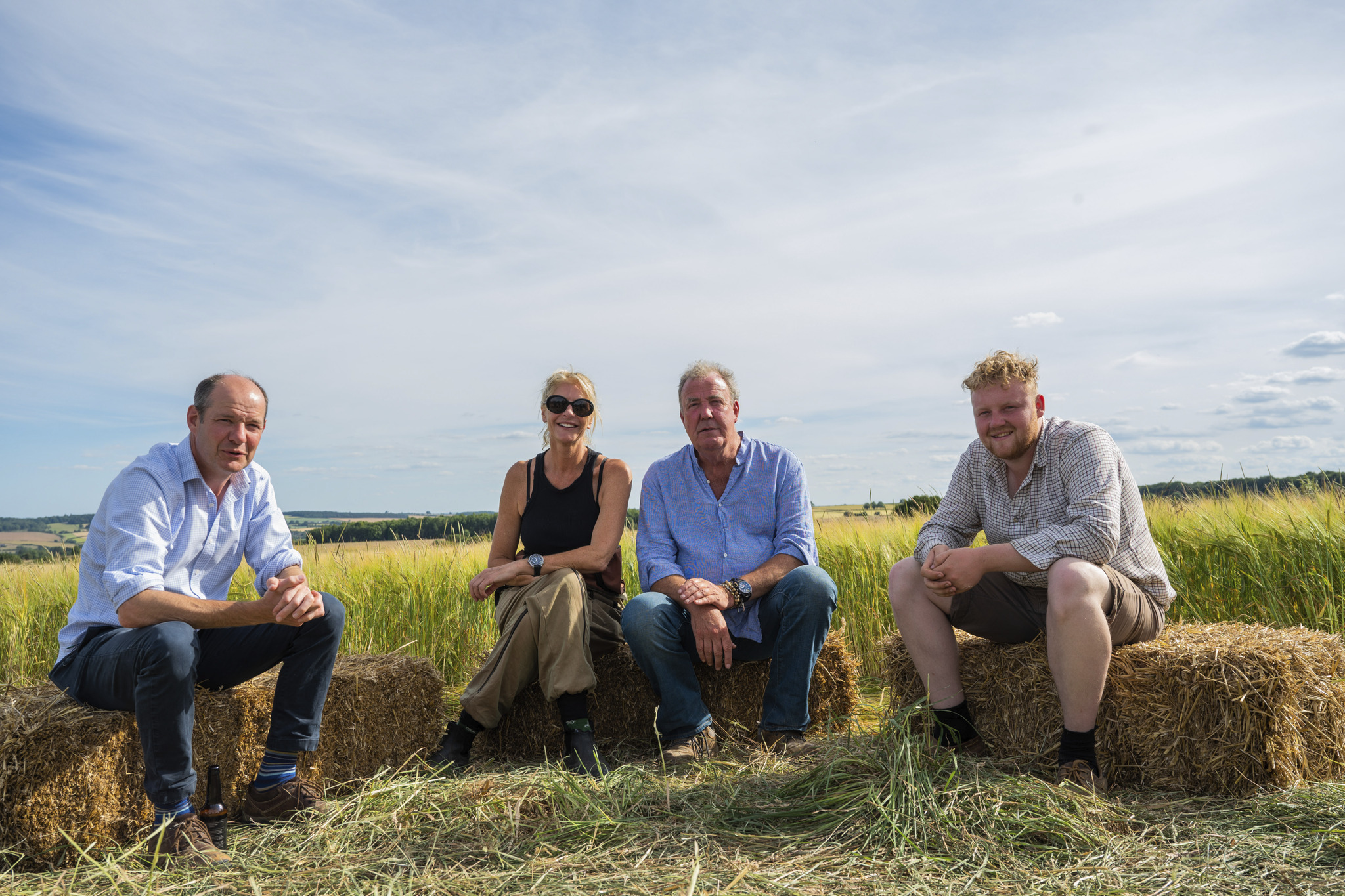
One Reply to “Clarkson’s Farm – Interview with Lisa Hogan & Charlie Ireland”
Comments are closed.